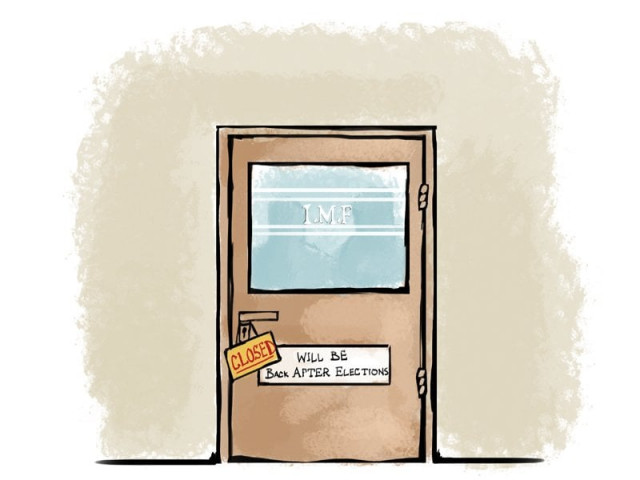With elections around the corner: Timeline issues delay decision on new IMF loan
Washington-based fund wants consensus across the board to approve programme.

The reluctance to own the action plan agreed by the outgoing setup could delay early signing of the programme. ILLUSTRATION: JAMAL KHURSHID
In the light of the indication by the government on holding general elections in the first week of May, the new bailout programme, under negotiations with a mission of the International Monetary Fund (IMF), faces questions regarding its timeline to avert a balance of payment crisis.
The IMF mission led by Jeffery Franks, the Washington-based fund’s chief to Pakistan, was in the town for the last nine days, holding talks for a second bailout programme under the garb of ‘Post Programme Monitoring’ dialogue. Both sides were negotiating a three-year Extended Stand-by Arrangement to build up foreign currency reserves that according to the IMF had already dropped “below adequate level”.
The dialogue will conclude by January 20.
According to senior officials of the finance ministry, the mission is expected to place Pakistan’s request for the bailout programme in the fund’s executive board in March- a time when caretaker setup is supposed to be installed in Pakistan.
The Federal Minister for Information and Broadcasting Qamar Zaman Kaira said the elections may be held on May 4 to 6. This suggests that the present assemblies will be dissolved any time in early March, putting a question mark over the commitments given by the present economic team to the IMF.

The officials of the finance ministry said during the policy level discussion, already started in Islamabad, the consensus was likely to be achieved on enhancing the tax to gross domestic product (GDP) ratio by 1% annually (Rs236.5 billion at the current size of economy) against the demand of 1.5% by the IMF. There was also almost a consensus over increasing electricity tariffs aimed at withdrawing subsidies, they added.
According to the first post programme monitoring report, the executive board underscored that reducing the large fiscal deficit was essential for restoring macroeconomic and external stability. To achieve this, they called for short-term revenue and expenditure efforts; including broadening the tax base and cutting back subsidies, while protecting the most vulnerable.
So far, it was unclear whether the new setup will honour these commitments, given by an economic team that was criticised by leading opposition parties for its failure to deliver and steer the economy out of the crisis. The officials added that the Finance Minister Dr Abdul Hafeez Shaikh held a meeting with Senator Ishaq Dar – the economic wizard of Pakistan Muslim League Nawaz faction. Shaikh took Dar into confidence over ongoing dialogue with the IMF, they added.
The endorsement of the set of actions planned by political parties without knowing exact state of the economy may not be possible, said Dr Ashfaque Hasan Khan, Dean of the Business School of the National University of Science and Technology.
The reluctance to own the action plan agreed by the outgoing setup could delay early signing of the programme. Pakistan was trying to seek the programme or at least an announcement at the earliest in a bid to pre-empt the balance of payments crisis that could trigger in March due to upcoming repayments to the IMF.
When contacted by The Express Tribune, Asad Umer, a senior leader of Pakistan Tehreek-e-Insaf (PTI), said the IMF was keen on meeting with the political party. When asked whether the PTI supported the bailout package, he said that considering the current state of the economy, IMF bailout loan was inevitable.
Independent experts were also questioning the timing of the IMF visit that preferred to travel to Islamabad despite a travel advisory. The experts wonder as to why the fund chose to come to Pakistan when it knew that the government was near the end of its tenure. While seeking anonymity, an official said if the political parties refused to sign the dotted lines, the IMF will have to send fresh mission in June-July to renegotiate the programme.
The Governor of the State Bank of Pakistan was taken aback when the economic team suddenly started talking to the IMF about a new loan during a meeting with the fund held in Washington last month.
Interestingly, the governor of the central bank was a co-signatory of the IMF programme along with the finance minister and supposed to be aware of the contours. Belatedly, Anwar had started taking part in the negotiations and attended a session held on Thursday.
Published in The Express Tribune, January 18th, 2013.
Like Business on Facebook to stay informed and join in the conversation.


















COMMENTS
Comments are moderated and generally will be posted if they are on-topic and not abusive.
For more information, please see our Comments FAQ